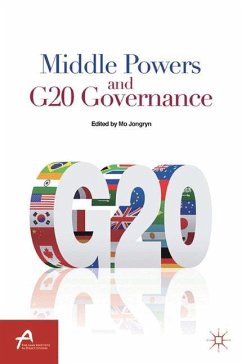
Broschiertes Buch
Charting Transnational Democracy
Beyond Global Arrogance
Herausgegeben: Leatherman, J.; Webber, J.
Versandkostenfrei!
Versandfertig in 6-10 Tagen

PAYBACK Punkte
20 °P sammeln!





This collection explores transnational peace and social-justice movements, their implications for international relations, and their potential for democratizing global governance. Contributors examine case studies on issue areas including human rights, security, environments and social/economic justice.
JANIE LEATHERMAN is Professor of Politics and Government and Director of the Office of International Affairs, College of Arts and Sciences at Illinois State University, USA. JULIE A. WEBBER is Assistant Professor of Politics at Illinois State University, USA.
Produktdetails
- Verlag: Palgrave Macmillan / Palgrave Macmillan US / Springer Palgrave Macmillan
- Artikelnr. des Verlages: 978-1-4039-6977-4
- 2005
- Seitenzahl: 324
- Erscheinungstermin: 1. März 2006
- Englisch
- Abmessung: 216mm x 140mm x 18mm
- Gewicht: 376g
- ISBN-13: 9781403969774
- ISBN-10: 1403969779
- Artikelnr.: 21240810
Herstellerkennzeichnung
Palgrave Macmillan
Tiergartenstr. 17
69121 Heidelberg
ProductSafety@springernature.com
'Comprehensive, cutting-edge coverage of perhaps the most timely topic on the global agenda today. Highly recommended for all students and scholars interested in the normative implications of the American hegemon's promotion of democracy throughout the world as a security policy.' - Charles W. Kegley, Pearce Professor of International Relations, University of South Carolina, USA
'Leatherman and Webber's book contributes to our knowledge of transnational social movements not only by assembling an important and timely collection of case studies but also by suggesting the creative and provocative lens of 'global arrogance' through which to explore relations of power, dominance, and resistance in the global system. By increasing flows
'Leatherman and Webber's book contributes to our knowledge of transnational social movements not only by assembling an important and timely collection of case studies but also by suggesting the creative and provocative lens of 'global arrogance' through which to explore relations of power, dominance, and resistance in the global system. By increasing flows
Mehr anzeigen
of information across political and social divides, social movements challenge the willful ignorance and mythmaking of global arrogance. The chapters in this collection help strengthen understandings of how social movements can contribute to democratic learning as they provide guidelines for avoiding the replication of global arrogance within these movements.' - Jackie Smith, Associate Professor of Sociology and Peace Studies, Joan B. Kroc Institute for International Peace Studies, University of Notre Dame, USA, and Co-editor of Transnational Social Movements and Global Politics: Solidarity Beyond the State, Globalization and Resistance: Transnational Dimensions of Social Movements and Coalitions Across Borders: Transnational Protest and the Neoliberal Order
'The study of transnational processes is enriched by this collection, which examines challenges to non-democratic global governance by transnational social movements and advocacy networks. Original research and conceptual sophistication are hallmarks of the book'. - Val Moghadam, Illinois State University and UNESCO and Author of Globalizing Women: Transnational Feminist Networks
'The authors critically examine a particular kind of dominance - arrogance; they do so within and across global, national, local and organizational levels. The significant cases analyzed in this book illustrate many ways that people resist arrogance and create alternative relationships. Significantly, too, the authors recognize the arrogance that can arise within organizations challenging domination in larger social systems. This is an exciting book about the new global realities.' - Louis Kriesberg, Maxwell Professor Emeritus of Social Conflict Studies, Syracuse University, USA
'The study of transnational processes is enriched by this collection, which examines challenges to non-democratic global governance by transnational social movements and advocacy networks. Original research and conceptual sophistication are hallmarks of the book'. - Val Moghadam, Illinois State University and UNESCO and Author of Globalizing Women: Transnational Feminist Networks
'The authors critically examine a particular kind of dominance - arrogance; they do so within and across global, national, local and organizational levels. The significant cases analyzed in this book illustrate many ways that people resist arrogance and create alternative relationships. Significantly, too, the authors recognize the arrogance that can arise within organizations challenging domination in larger social systems. This is an exciting book about the new global realities.' - Louis Kriesberg, Maxwell Professor Emeritus of Social Conflict Studies, Syracuse University, USA
Schließen
Für dieses Produkt wurde noch keine Bewertung abgegeben. Wir würden uns sehr freuen, wenn du die erste Bewertung schreibst!
Eine Bewertung schreiben
Eine Bewertung schreiben
Andere Kunden interessierten sich für













